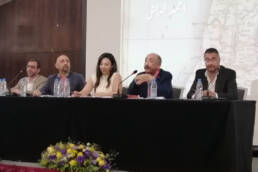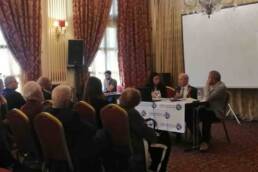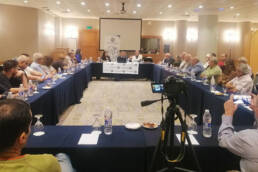The Center for Arab Unity Studies held a seminar on “The Libyan Crisis: War, Foreign Intervention, and Prospects for Peace”, via Zoom application, on Wednesday afternoon August 12, 2020. The dialogue revolved around the internal and external factors of the Libyan crisis, its components, dynamics, and prospects for formulating a solution that establishes for A comprehensive Libyan agreement that can restore security, stability and hope to the country in achieving democracy and development. The seminar was presented by the Center’s General Director, Luna Abu Sweireh, and the discussion was moderated by Youssef Al-Sawani, Director of Studies in the center, in which specialists and researchers on the Libyan issue participated.
The seminar hosted two main speakers, Khaled Al-Ghwail and Yunus Fannoush, and a number of participants from Libya, Arab countries and Turkey. The participants dealt with the set of factors that represent the components of the Libyan crisis, on top of which was the external factor in all its levels and complexities, which since the beginning of the international intervention in 2011 has been one of the most important and dangerous components of this crisis and a major reason for its difficulty in achieving a political solution. The interlocutors did not neglect to address the internal factors, including the previous regime, the absence of a culture of democracy, the disintegration of the Libyan social mix, and the militia’s control of the state due to the militarization of the movement in 2011, which led to the state’s fragility and power-sharing among the leaders of these militias. Some attributed the deviation of the Libyan revolution from its goals to the lack of sufficient maturity of most of the political elites, who had given priority to factional interests over public interests, which led to fueling the conflict.
In searching for solutions, more than one participant talked about the necessity of founding a new “social contract” that establishes the new Libyan state, stressing the importance of security arrangements to reach the desired political solution while preserving the unity of the Libyan state. Some spoke of a consensual constitution as one of the outcomes of the solution, as well as an effective role that The Arab Maghreb and neighborhood countries can play in this regard. The interlocutors differed about the role of the United Nations and its ability to be part of the solution in Libya, especially as it did not solve the other Arab crises in order to be able to solve the Libyan crisis.
The seminar was broadcast live on the Zoom app and on the public page of the Center for Arab Unity Studies on Facebook, and will be published later in the Arab Future magazine. It was interspersed with comments and written questions from viewers.
You can watch the full panel discussion here:
مركز دراسات الوحدة العربية
فكرة تأسيس مركز للدراسات من جانب نخبة واسعة من المثقفين العرب في سبعينيات القرن الماضي كمشروع فكري وبحثي متخصص في قضايا الوحدة العربية
We appreciate your support
SUPPORT THE CENTRE FOR ARAB UNITY STUDIES
The Centre is reaching out for its friends and readers for support, whether by ordering our publications and paying for them in hard currency, or through donations. The Centre welcomes any support to boost its resiliency, to ensure its survival, the continuation of its legacy and its commitment to tackle issues facing the Arabs and the Arab world.



